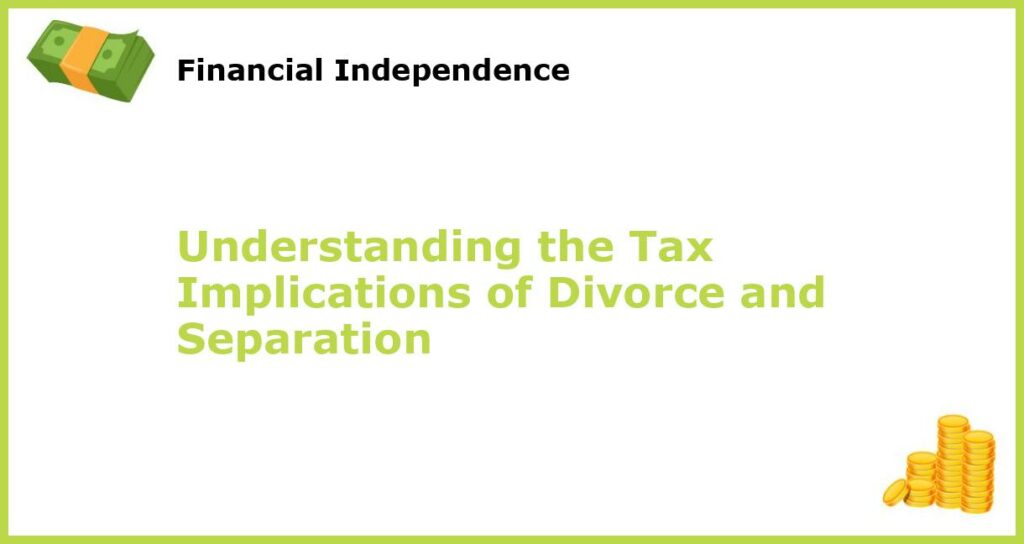Divorce and separation are difficult times, and their impact on finances should not be underestimated. Taxes are among the many aspects that require attention and planning, as they can have a significant effect on your financial well-being. In this article, we will explore the tax implications of divorce and separation and answer some frequently asked questions. By understanding these implications and seeking professional advice, you can manage your taxes more effectively and avoid any unpleasant surprises from the IRS.
1. What is the impact of divorce or separation on taxes?

Divorce or separation can affect taxes in many ways, depending on your situation. The most obvious effect is the change in marital status, which determines the filing status, tax brackets, and deductions applicable to you. You may also experience changes in your income, property, and expenses, which can affect your tax liability. For instance, if you receive alimony payments, you must report them as income on your tax return, while if you pay child support, you cannot deduct it from your taxes. Therefore, it is crucial to understand these changes and factor them into your tax planning.
2. How are alimony and child support taxed?

Alimony, also known as spousal support, is taxable income for the recipient and deductible for the payer. This means that if you receive alimony payments, you must include them in your gross income when filing your tax return. Conversely, if you pay alimony, you can deduct the payments from your taxable income on your tax return. However, keep in mind that the rules for alimony vary by state, so consult with a tax professional to ensure compliance. In contrast, child support payments are not taxable or deductible, meaning that the recipient does not have to report them as income and the payer cannot claim them as deductions.
3. What happens to joint tax returns after divorce?

While married, couples can choose to file joint tax returns, which may result in lower tax liability due to lower tax rates and higher deductions. However, after divorce, the ex-spouses must file separate tax returns using the single or head of household filing status. This change may affect their taxes in several ways, such as higher tax rates, lower deductions, and different credits. For example, the head of household status may entitle the custodial parent to claim the child tax credit or the earned income tax credit, while the non-custodial parent may still claim the child as a dependent and deduct certain expenses related to visitation.
4. How does property division affect taxes?

Property division is often one of the most contentious issues in divorce cases, as it involves assets such as a house, a car, a retirement account, or investments. The tax implications of these assets can vary, depending on who receives them and how they are handled. For example, if one spouse receives the house, they may also inherit the mortgage and the property taxes associated with it. Or if one spouse receives the retirement account, they may incur early withdrawal penalties or mandatory withholding upon distribution. To minimize your tax liability, it is essential to consider these factors when negotiating property division and seek professional advice.
5. What is the impact of custody and support orders on taxes?

Custody and support orders determine the responsibilities of each parent regarding the care and financial support of their children. These orders can also affect your taxes in various ways. For example, the custodial parent usually claims the child as a dependent on their tax return, which entitles them to certain tax credits and deductions. The non-custodial parent may still deduct certain expenses related to visitation or medical care. Childcare expenses may also qualify for the child and dependent care credit, which reduces the taxes owed. It is essential to keep accurate records of these expenses and report them correctly on your tax return.
6. How do retirement accounts and pensions affect taxes?

Retirement accounts and pensions are often significant assets that must be divided upon divorce. However, these assets may come with tax implications that you need to be aware of. For example, withdrawing funds from a retirement account before age 59½ may result in an early withdrawal penalty of 10%. Also, distributions from tax-deferred accounts such as 401(k)s or traditional IRAs are subject to income tax at the ordinary rate. However, distributions from Roth IRAs or Roth 401(k)s are tax-free if certain conditions are met. It is crucial to factor in these taxes when negotiating property division and seek professional advice to understand your options.
7. What is the impact of the Tax Cuts and Jobs Act (TCJA)?
The 2017 TCJA brought significant changes to the tax code, which affect divorce and separation as well. One of the most notable changes is the treatment of alimony payments. Before 2019, alimony payments were deductible for the payer and taxable as income for the recipient. However, the TCJA reversed this treatment, which means that alimony payments made after 2018 are not deductible for the payer and not included as income for the recipient. This change may affect your taxes if your divorce was finalized after 2018, so consult with a tax professional. The TCJA may also affect your filing status, deductions, and credits, so review your tax situation accordingly.
8. Can you deduct legal fees for divorce or separation?
In general, legal fees for a divorce or separation are not tax-deductible, as they are considered personal expenses. However, there are some exceptions to this rule. For example, if you incur legal fees to produce or collect taxable income, such as alimony, you may deduct these fees on your tax return as miscellaneous itemized deductions subject to a 2% limit. Also, if you claim innocent spouse relief, you may deduct the legal fees related to that claim. Consult with a tax professional to determine if you qualify for any deductions or credits related to your divorce or separation.
9. Why is it essential to consult with a tax professional?
Divorce and separation can be complex matters that affect many areas of your life, including taxes. Seeking professional advice from a tax professional can help you navigate the tax implications of your situation and avoid costly mistakes. A tax professional can assist you with tax planning, negotiation, and compliance, such as correctly reporting alimony, child support, or property division. They can also provide guidance on how to minimize your tax liability and claim any available credits or deductions. Therefore, don’t hesitate to seek their help whenever you need it.
10. What are some practical tips for managing taxes during divorce or separation?
Here are some tips to help you manage your taxes during divorce or separation:
- Keep good records of income, expenses, and tax documentation, including divorce decree, support orders, and property division agreements;
- Consider the tax implications of all decisions, such as property division, alimony, and child support, and factor them in your negotiations;
- Review and update your withholding, deductions, and estimated tax payments to avoid underpayment penalties;
- Get professional tax advice before and after the divorce or separation to ensure compliance and minimize taxes;
- File your tax returns accurately and on time, to avoid penalties and interest. If you need more time to file, you can request an extension of up to six months.
By following these tips and seeking professional advice, you can manage your taxes more effectively and reduce the stress of divorce or separation.







